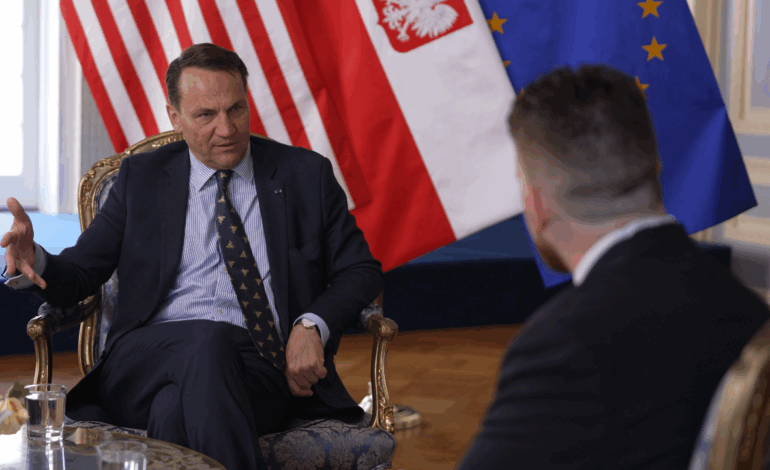Poland’s Deputy PM Discusses NATO, Defense Spending, and History

Poland’s Deputy Prime Minister and Foreign Minister Radoslaw Sikorski recently shared insights on the evolving military landscape in Europe during an exclusive interview following a significant meeting between Polish President Karol Nawrocki and U.S. President Donald Trump. The discussions centered on U.S. military commitments to Poland and the broader implications for NATO amid the ongoing conflict in Ukraine.
In the wake of Poland’s historical struggles, Sikorski emphasized that the nation is now at the forefront of European defense initiatives. Poland, which has transformed from a Soviet satellite state to a leading military power within NATO, currently boasts the third-largest army in the alliance, following the United States and Turkey. The country allocates approximately 4.2 percent of its GDP to defense, with projections indicating an increase to 4.7 percent this year.
Sikorski articulated a clear rationale behind Poland’s substantial military investments, stating, “In Poland, we have a saying: Every country has an army, either your own or a foreign one. And to our cost, we have learned many times that your own is cheaper.” He also underscored the urgency for Europe to meet its defense spending commitments, particularly in light of President Trump’s calls for NATO members to increase their military budgets to 5 percent of GDP.
Historical Context and Current Threats
Reflecting on Poland’s tumultuous past, Sikorski recalled the devastating impact of World War II and the lessons learned from history. He drew parallels between past and present threats, particularly regarding Russia’s aggressive actions in Ukraine. The Deputy Prime Minister described Russia’s 2014 annexation of Crimea as reminiscent of historical aggressions, warning that any perceived concessions could lead to further territorial ambitions.
“Remember at Munich, outsiders forced Czechoslovakia into making concessions, and it didn’t work,” Sikorski noted, urging a firm stance against Russian aggression. He emphasized the need for NATO to pressure Vladimir Putin to halt his military campaign and to ensure that any peace negotiations involve substantial concessions from Russia.
Poland shares borders with Ukraine and Belarus, as well as the Russian exclave of Kaliningrad, making its security particularly vulnerable. The ongoing conflict has prompted incidents where missiles and drones have strayed into Polish airspace, heightening concerns over regional stability. In November 2022, two Polish citizens lost their lives when a missile struck a border village, underscoring the immediate dangers posed by the conflict.
A Resilient Economy Underpinning Military Strength
While military readiness is critical, Sikorski also highlighted the importance of Poland’s robust economy as a foundation for its defense capabilities. Since the dissolution of communism, Poland has experienced consistent economic growth, often referred to as the “Polish miracle.” The country has avoided recession for most of the past three decades, and projections suggest that income per capita will soon surpass that of Japan.
Sikorski attributed this economic resilience to strategic reforms that have fostered broad-based growth, avoiding the oligarchic tendencies seen in some neighboring countries. “We don’t have areas of extreme wealth and extreme poverty,” he explained, emphasizing the stability that such an economy provides for national defense.
Looking ahead, Poland aims to continue its military modernization and readiness, while also preparing logistical support for Ukraine. Sikorski mentioned that Polish military planners are considering potential scenarios for a ceasefire and the subsequent training of Ukrainian forces.
As Europe grapples with the implications of rising right-wing populism and skepticism towards NATO, Sikorski acknowledged the complexity of the political landscape. He pointed to the need for established parties to address the real grievances that have given rise to such movements, particularly concerning migration and social stability.
Poland’s proactive approach to defense and its historical context position the country as a vital player in European security. As the situation continues to evolve, Sikorski’s insights reflect a commitment to ensuring that Poland does not repeat the mistakes of its past while navigating the challenges of the present.






